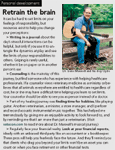A hard look at the ties that bind
Your compassionate care for patients, clients, and staff has a limit. Here's how one doctor learned where his responsibility ends.
If you could go back in time and out of body to watch yourself working at today's appointments, what would you see? The visits—20, 30, even more—would be quite a parade of people, animals, and needs, wouldn't they? Ill-mannered children acting like hooligans, cats strung out on the fight-or-flight response, passive owners intimidated by their aggressive dogs, elderly clients with only their pets for companionship—it's no wonder you feel tired. Actually, it's pretty amazing that you don't feel more exhausted.
While our work can be gratifying, it exacts an emotional and physical toll that doesn't always show up on a monthly profit-and-loss statement. Despite the fact that these emotional expenses are difficult to quantify, you can be sure they have a direct effect on the bottom line.
I became aware of these emotional costs a few years ago when I realized I was struggling with burnout. In my journey toward recovery from this emotional depletion, I obtained counseling from a psychologist experienced in helping healthcare professionals. I learned that it's crucial for us to understand our exact role in the exam room and avoid carrying the whole world on our shoulders. Such understanding helps us avoid emotional overdrafts and maximize our long-term profits.

Reflecting on his relationships with others helped Dr. Gene Maxwell conquer burnout and learn he had a responsibility to, not for, others.
Here's what we need to learn: We have a responsibility to, not for, the patients, clients, and team members we deal with every day. It may sound like semantics, but read on and you'll see what I mean.
The patient
The opportunity to work with animals is why many of us were drawn to veterinary medicine. Upon our admission to the profession, we took an oath that reflected our commitment to animals. As it has been said before, "Of all the people in the exam room, the veterinarian is the only person qualified to speak for the animal."
This is our responsibility as clinicians, and we fulfill this responsibility in two ways. First, we examine the pet and evaluate its health. Then we make clear recommendations to the owner. We also educate clients about the importance of complying with our recommendations. However, except in cases of criminal abuse or neglect, once we have completed our evaluation, recommendations, and medical work, we're done.
Notice that our responsibility is to the animal and not for the animal. That difference is significant.
If, for example, one of your patients has an ongoing problem with obesity and you make yourself responsible for the pet, what are you going to do? Go home with the client and demonstrate appropriate feeding and exercise techniques? Conduct subsequent home inspections? Move in?

Personal development: Retrain the brain
If we make ourselves responsible for our patients, time constraints alone will limit the number of patients we can accept—and the number of animals we can help. In spite of our professional expertise, the clients retain ownership of their pets and therefore bear final responsibility for them.
If this distinction isn't clear in our minds and we feel responsible for every animal placed in front of us, we risk overextending ourselves. We find ourselves providing care without being adequately (or even inadequately) compensated. We start seeing our hospitals as orphanages and adoption agencies, our bank accounts as finance centers for the uncreditworthy, and our staff members as in-home nursing care providers.
Here's an example from my own practice. I had an elderly client with a diabetic dog. The woman's vision was so bad she could not see to accurately draw up the insulin into the syringe. Feeling sorry for this woman whose dog was her only companion, I instructed my staff to draw up insulin doses into syringes, two weeks' worth at a time. We continued this service—at no charge to her—for years. My receptionist even delivered the preloaded syringes to her home when the weather was too bad for her to drive. The kicker: After the dog died of cancer, this client refused to pay her past-due balance, citing the fact that she was on a fixed income.
However, financial loss isn't the worst consequence of not understanding our role limitations. The emotional toll we pay is most damaging. I've felt frustration, resentment, and bitterness when people have avoided (or tried to make me assume) responsibility for their pet. And I've felt guilt when I've chosen not to do go above and beyond the call of duty, or when I've had to discuss finances with parents in front of teary-eyed children with a sick or injured pet.
If we're not careful, these emotional debts build up over time and then come due with interest compounded in the form of health problems, staff turnover, low office morale, and damaged personal relationships. Understanding that we have limits is the first step toward reducing these unnecessary emotional expenditures.

Dr. Gene Maxwell
The owner
What are our legitimate responsibilities to the pet owner? First, let's consider what they're not.
We're not responsible for owners' personal schedule and time management. It's not our duty to perform complicated tests and treatments on a timetable dictated by their daily routine. We're not obligated to have the diagnostic workup completed by 3 p.m. so Mom can pick up the pet after getting the kids from school. We must balance our eagerness to please and our need to create satisfied customers with our commitments to other clients already booked on the schedule.
We're not responsible for making sure pets' follow-up care (or, in fact, pet ownership itself) causes the owner no inconvenience. Diabetes requires insulin, infections require antibiotics, and some skin conditions require ongoing management. When an owner complains about her pet's follow-up care requirements, there is often little we can do to make things easier for her and at the same time meet the highest standard of care.
Most important, we are not responsible for balancing clients' checkbooks and keeping them within their monthly budget. It's not our job to shield them from difficult financial decisions by reducing our standard fees, by failing to make strong recommendations, or by inappropriately extending credit. I've been astounded by some of the reasons affluent clients have given when they've asked me to extend credit—their house payment is due next week, or Junior's having a birthday this month.
Although clients can pressure us to take responsibility for their finances, we often take on the responsibility all on our own. We make assumptions about what a client won't pay or can't afford and then let these assumptions influence our recommendations.
It's time to remind ourselves that we are responsible to the pet owners, not for them. Our role is to make recommendations clearly and respectfully, and then let our clients decide for themselves about the use of their time and money.
The team
Here's where our relationships start to shift, because in some ways we are responsible for our staff. We're responsible for team members' safety on the job, and we can be held responsible for their actions in the event of negligence, malpractice, or abuse. However, our primary responsibility to employees is financial. We must run practices that can pay their wages and pay them on time. Implicit in this obligation is the idea that we make a profit to allow for future pay increases and the ongoing training of team members.
The missing link: you
So now that we've reviewed our responsibilities to, not for, everyone, we've got a good grip on all the stakeholders, right?
Wrong.
Remember those imagined scenes of the day's appointments? Did we cover everybody? No. There are four characters in each exam room scenario: the pet, the owner, the team member, and you.
Of the four, you are the only one for whom you are truly responsible. You're the only person whose actions you can control. And even though others are affected, you're the primary person who bears the consequences of your decisions. You can delegate tasks such as scheduling and billing to your staff, but you alone face the financial, physical, and emotional consequences if you consistently stretch beyond your personal limits.
This means that it's up to you to control your schedule enough to allow you to complete work already promised, to be available to your established clients and their inevitable emergencies, and to have something left for your family at the end of the day. If this means saying no to new requests or requests made strictly for a client's convenience, then so be it. You may choose to accommodate certain requests when reasonable, but it's not necessary for your client's schedule problems to become your schedule problems.
It's your responsibility to set fees high enough to provide for the ongoing operation and expansion of your practice, to provide for your family's needs, and to provide for your retirement (unless you trust your kids and the government to take care of you in your golden years). Once you set those fees, it's up to you to see that they're consistently charged, and then actually paid.
By being responsible for yourself, you'll also relieve others of the burden of helping you pick up the pieces in the event of a meltdown—financial or emotional. And you'll ensure that you'll have something of yourself to give to family, patients, and clients in the future. Guarding against the tendency to inappropriately assume responsibility for others will help you avoid the burnout that's sure to result if you continually try to fix everything for everybody.
Look inward, look ahead
In my own journey, as I learn to be responsible for myself and cautious about assuming responsibility for others, I've noticed a gradual decrease in my frustration and anxiety levels. I've come to accept that others are allowed to ask, and I am allowed to say no. And I more confidently recommend what's best for my patients, knowing that the final responsibility for the animal lies with its owner.
The next time you enter an exam room, take that mental step back and think about your responsibilities— including those for yourself. Look at those present in the exam room—patient, owner, team member—and ask yourself, "Who am I responsible to, and who am I responsible for?"
Dr. Gene Maxwell owns and practices at Town & Country Animal Hospital in McMinnville, Tenn. Send questions or comments to ve@advanstar.com